You are viewing the Cultures of Knowledge Blog archive for the ‘Events’ Category:
James Brown
April 18, 2011
Events, Lectures, Project Updates
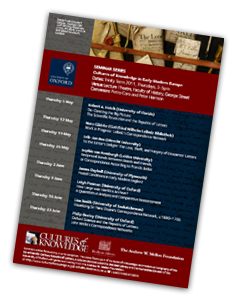 Please join us for the second Cultures of Knowledge seminar series, which will once again take place in Trinity Term 2011 on Thursdays at 3–5pm in the Lecture Theatre of the History Faculty. Entitled ‘Cultures of Knowledge in Early Modern Europe’, and convened by Pietro Corsi and Peter Harrison, the seminar features another impressive programme of eight leading international authorities on seventeenth-century correspondents and correspondence networks. Papers and discussion will be followed by a wine reception. For the full programme and further details, please see the seminar webpage. The seminar poster (pdf) can be downloaded on the right.
Please join us for the second Cultures of Knowledge seminar series, which will once again take place in Trinity Term 2011 on Thursdays at 3–5pm in the Lecture Theatre of the History Faculty. Entitled ‘Cultures of Knowledge in Early Modern Europe’, and convened by Pietro Corsi and Peter Harrison, the seminar features another impressive programme of eight leading international authorities on seventeenth-century correspondents and correspondence networks. Papers and discussion will be followed by a wine reception. For the full programme and further details, please see the seminar webpage. The seminar poster (pdf) can be downloaded on the right.
James Brown
March 21, 2011
Conferences and Workshops, Events, Project Updates, Projects and Centres
Tags: CKCC, Digitization, Geography, Mapping the Republic of Letters, Networks, Spatial Theory, Union Catalogue, Visualization
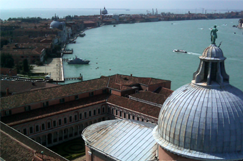
The Fondazione Giorgio Cini on San Giorgio Maggiore, with the island of Guidecca visible in the distance.
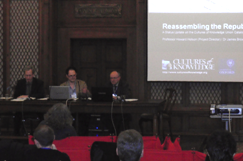
Our panel at the conference, shared with Charles van den Heuvel from CKCC (Huygens Institute).
Last week provided us with an opportunity to present the Project, specifically its union catalogue and associated editorial tools, at the international conference Mapping the Republic of Letters (Venice, 17–18 March 2011). Convened by the Stanford-based project of the same name (based at the Stanford Humanities Center), and held in and co-organised by the Fondazione Giorgio Cini on the island of San Giorgio Maggiore, the event showcased the work being undertaken by various individuals and projects worldwide to collate and represent digitally and spatially the early modern republic of letters. It also explored the research question of whether global exchanges of correspondences and other texts might be best conceived of as a state or as a network. While main sessions provided insights into the very wide range of approaches to this topic, associated meetings introduced the activities of the Milan-based research laboratory Density Design, and facilitated collaborative discussions amongst CofK, our hosts Mapping the Republic of Letters (Stanford), and CKCC (Huygens Institute), who also presented at the event. For further details, please see the conference webpage.
We will be presenting the Project at a wide range of correspondence-related events in 2011. For full details of our speaking schedule, please see the presentations page.
 A symposium on Early Modern Data Delivery will take place in the English Faculty of the University of Oxford on Monday 28 February 2011. The event will focus on letters as a manifestation of seventeenth-century information exchange, and will feature the following contributions:
A symposium on Early Modern Data Delivery will take place in the English Faculty of the University of Oxford on Monday 28 February 2011. The event will focus on letters as a manifestation of seventeenth-century information exchange, and will feature the following contributions:
- Johanna Harris (University of Exeter), ‘Obstinate Letters: Lady Brilliana Harley’s Defence of Brampton Bryan’
- Kate McLoughlin (Birkbeck, University of London), ‘Information Delivery in Shakespeare’s Macbeth and Stoppard’s Cahoot’s Macbeth: A Habermasian Reading’
- Katherine Duncan-Jones (University of Oxford), ‘A ‘Tragicall’ Letter (c. 1604): Writer, Recipient, Bearer’
The symposium will be held in Lecture Room 2 from 5pm.
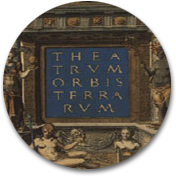 Further to the CFP (which is now closed), full details are now available for the conference The Global Dimensions of European Knowledge, 1450-1700, which will take place at Birkbeck, University of London on 24–25 June 2011. The conference will investigate the impact of European exploration and travel on the structures, contents and sources of authority of European knowledge c.1450-1700, seeking to explore connections between the making of knowledge and a broad range of intellectual, political, cultural, religious and mercantile encounters between Europe and the wider world. For keynotes, panels, abstracts, and speaker biographies, please visit the conference website.
Further to the CFP (which is now closed), full details are now available for the conference The Global Dimensions of European Knowledge, 1450-1700, which will take place at Birkbeck, University of London on 24–25 June 2011. The conference will investigate the impact of European exploration and travel on the structures, contents and sources of authority of European knowledge c.1450-1700, seeking to explore connections between the making of knowledge and a broad range of intellectual, political, cultural, religious and mercantile encounters between Europe and the wider world. For keynotes, panels, abstracts, and speaker biographies, please visit the conference website.
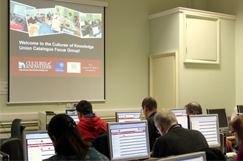
Testing the interface.
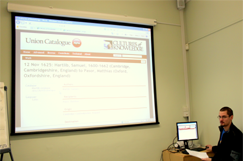
Discussing improvements.
With the front-end prototype of the Project’s union catalogue (introduced at our 2010 conference) now at an advanced stage of development – 39,225 letter records and counting! – Friday 4 February provided us with an opportunity to test its existing features and solicit additional suggestions from a range of end users from both within and outside the Project. Under the auspices of Dr Kim McLean-Fiander, a group of librarians, scholars, systems developers, web designers, and user experience specialists spent the morning working their way through a series of key tasks developed to test the catalogue’s function and design, and then recording their experiences, both positive and negative, on specially created feedback forms. Testers regrouped in the afternoon to discuss necessary refinements and to make additional suggestions to the catalogue on a screen-by-screen basis. The feedback we received was invaluable, and we would like to thank all of our participants for giving up their time to help us improve the catalogue, the public version of which will be launched in autumn 2011.
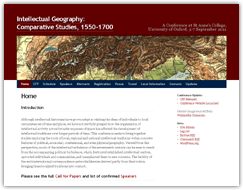 The CFP for the next Project conference, Intellectual Geography: Comparative Studies, 1550-1700, to be held at St Anne’s College, University of Oxford from 5-7 September 2011, has now been released. Confirmed keynote speakers include Professor Miles Ogborn (Queen Mary, University of London) and Professor Thomas DaCosta Kaufmann (Princeton University). The conference will explore prospects for an analytical geography of the concrete spatial features both underpinning national and international networks of learned correspondence and nurturing the intellectual traditions exchanged through those networks. It will examine the material conditions structuring epistolary communication, the geographical features conditioning local, regional, and national intellectual traditions, and the ideas generated when international networks brought these localized traditions into contact. At the centre of the conference will be a comparison of how the radically different physical, political, and confessional geographies of England and the Holy Roman Empire structured intellectual activity in manners radically different and hitherto unappreciated, and how the wars and reformations of the seventeenth century cross-fertilized these traditions in highly significant ways. The deadline for abstracts is 1 April 2011. For the full CFP, please visit the conference microsite.
The CFP for the next Project conference, Intellectual Geography: Comparative Studies, 1550-1700, to be held at St Anne’s College, University of Oxford from 5-7 September 2011, has now been released. Confirmed keynote speakers include Professor Miles Ogborn (Queen Mary, University of London) and Professor Thomas DaCosta Kaufmann (Princeton University). The conference will explore prospects for an analytical geography of the concrete spatial features both underpinning national and international networks of learned correspondence and nurturing the intellectual traditions exchanged through those networks. It will examine the material conditions structuring epistolary communication, the geographical features conditioning local, regional, and national intellectual traditions, and the ideas generated when international networks brought these localized traditions into contact. At the centre of the conference will be a comparison of how the radically different physical, political, and confessional geographies of England and the Holy Roman Empire structured intellectual activity in manners radically different and hitherto unappreciated, and how the wars and reformations of the seventeenth century cross-fertilized these traditions in highly significant ways. The deadline for abstracts is 1 April 2011. For the full CFP, please visit the conference microsite.
 Please join us for the second Cultures of Knowledge seminar series, which will once again take place in Trinity Term 2011 on Thursdays at 3–5pm in the Lecture Theatre of the History Faculty. Entitled ‘Cultures of Knowledge in Early Modern Europe’, and convened by Pietro Corsi and Peter Harrison, the seminar features another impressive programme of eight leading international authorities on seventeenth-century correspondents and correspondence networks. Papers and discussion will be followed by a wine reception. For the full programme and further details, please see the seminar webpage. The seminar poster (pdf) can be downloaded on the right.
Please join us for the second Cultures of Knowledge seminar series, which will once again take place in Trinity Term 2011 on Thursdays at 3–5pm in the Lecture Theatre of the History Faculty. Entitled ‘Cultures of Knowledge in Early Modern Europe’, and convened by Pietro Corsi and Peter Harrison, the seminar features another impressive programme of eight leading international authorities on seventeenth-century correspondents and correspondence networks. Papers and discussion will be followed by a wine reception. For the full programme and further details, please see the seminar webpage. The seminar poster (pdf) can be downloaded on the right.


 A symposium on Early Modern Data Delivery will take place in the
A symposium on Early Modern Data Delivery will take place in the  Further to the
Further to the 



 Join
Join 